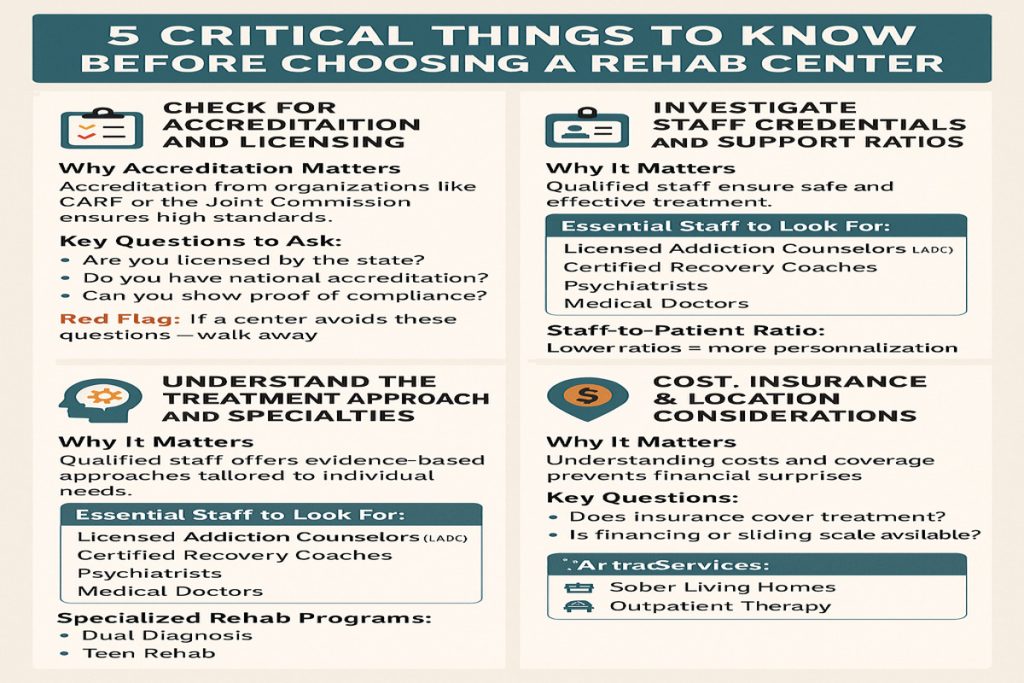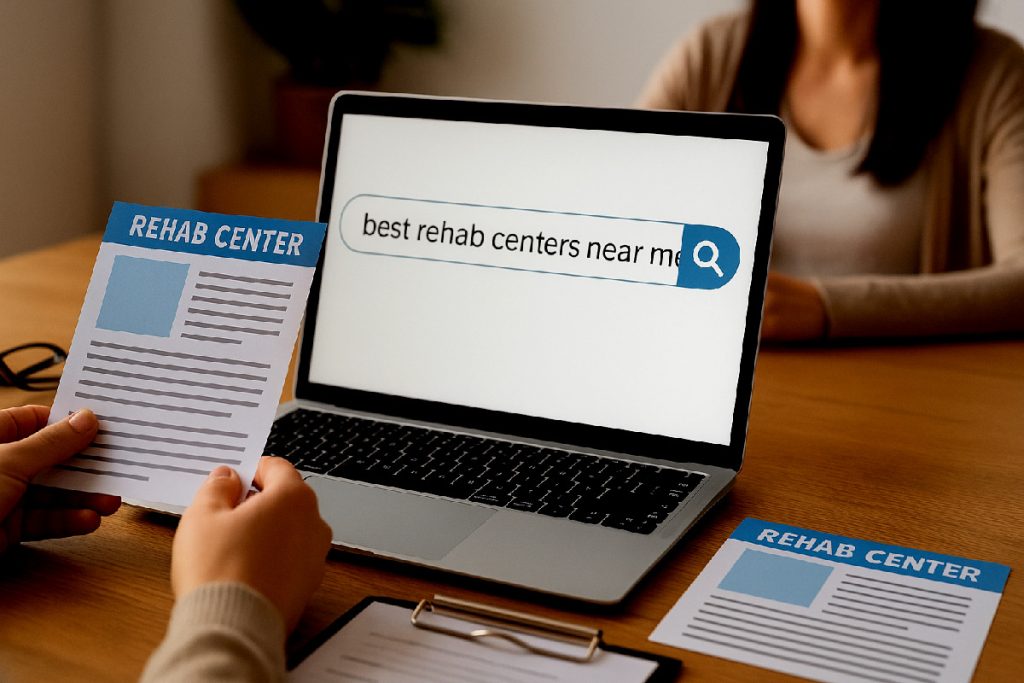Choosing a rehab center is one of the most critical decisions you’ll make in the journey toward recovery-whether it’s for yourself or someone you love. With so many options available, from luxury facilities to community-based centers, it can be overwhelming to know where to start. The wrong choice can lead to ineffective treatment, relapse, and wasted resources. The right one can be life-changing.
As an experienced rehabilitation consultant, I’ve seen firsthand the difference a carefully chosen treatment program can make.
This blog breaks down the How to Choose the Right Rehab Center, using real-world insights, professional advice, and a touch of tough love. Whether you’re struggling personally, educating yourself, or helping a friend or family member, this guide is built to empower your decision-and optimized to help you find it online.
Why Choosing the Right Rehab Center Matters

Selecting the right rehab center isn’t just about amenities or location-it can directly impact your recovery outcomes. According to the National Institute on Drug Abuse (NIDA), effective treatment addresses multiple needs of the individual, not just substance use. Unfortunately, not all facilities take this comprehensive approach.
What can go wrong with the wrong choice?
- One-size-fits-all programs that ignore individual trauma or co-occurring disorders
- Unqualified staff lacking the training to handle complex addictions
- No aftercare plan, increasing relapse risks
- Overpriced programs that drain finances without delivering results
Imagine Jane, who picked a rehab center for her son based on a flashy website and promises of “quick recovery.” The center lacked proper accreditation, had high staff turnover, and offered no aftercare. Her son relapsed within weeks, and Jane was left feeling helpless and financially strained.
The right rehab center is a blend of medical science, emotional support, and long-term planning. That’s why understanding what to look for is so critical when choosing a rehab center or picking the right drug rehab for yourself or a loved one.
5 Critical Things to Know Before Choosing a Rehab Center

1. Check for Accreditation and Licensing
Why Accreditation Matters
Accreditation from organizations like CARF (Commission on Accreditation of Rehabilitation Facilities) or The Joint Commission ensures that the facility adheres to high standards of care, safety, and ethics. Licensed rehab centers are regularly inspected and must comply with state and national regulations.
Key Questions to Ask:
- Are you licensed by the state health department?
- Do you have national accreditation from CARF or The Joint Commission?
- Can you show proof of compliance and inspections?
Red Flag:
If a center avoids these questions or hesitates to provide documentation-walk away.
2. Understand the Treatment Approach and Specialties
Why It Matters
Effective rehab isn’t one-size-fits-all. The best rehab centers offer evidence-based approaches tailored to individual needs. Look for centers that provide a range of therapies and specialized programs.
| Approach | Description |
| CBT (Cognitive Behavioral Therapy) | Helps change negative thought patterns |
| Holistic Programs | Focus on mind-body-soul (yoga, meditation, nutrition) |
| 12-Step Programs | Faith-based or spiritual recovery models |
| Medication-Assisted Treatment (MAT) | Uses medications for opioid recovery |
Specialized Rehab Programs:
- Dual Diagnosis: For individuals with mental health and substance use disorders
- Teen Rehab: Age-appropriate care for adolescents
- LGBTQ+ Inclusive: Affirming and culturally competent care
Expert Tip:
Ask: Do you create individualized treatment plans after assessment? What makes your rehab center effective for dual diagnosis or specific populations?
3. Investigate Staff Credentials and Support Ratios
Why It Matters
Would you trust a heart surgeon with no license? Rehab staff credentials are just as critical. Qualified rehab staff ensure safe, effective treatment and a supportive rehab environment.
Essential Staff to Look For:
- Licensed Addiction Counselors (LADC)
- Certified Recovery Coaches
- Psychiatrists (especially for dual diagnosis)
- Medical Doctors (MDs)
- Therapists (MSW, LMFT, LPC)
Staff-to-Patient Ratio:
Lower ratios = more personalized attention. Ideal: 1 staff per 3–5 clients.
Pro Tip:
Ask how often clients get 1:1 therapy sessions per week. Is there 24/7 medical support, especially during detox?
4. Ask About Family Involvement & Aftercare Programs
Why It Matters
Addiction doesn’t happen in a vacuum. A quality rehab center understands the role of family and community in healing.
Family Involvement:
- Family therapy sessions
- Weekly progress updates
- Educational workshops for family members
Aftercare Services:
| Aftercare Type | Benefit |
| Sober Living Homes | Transitional housing post-treatment |
| Outpatient Therapy | Continued therapy after inpatient care |
| Relapse Prevention | Tools and strategies to manage triggers |
Real-Life Scenario:
A patient, Mark, stayed sober for two years thanks to a structured aftercare program that included weekly group therapy and peer support.
5. Cost, Insurance & Location Considerations
Why It Matters
Rehab is a significant investment. Costs vary widely depending on the type of facility (private, public, luxury, nonprofit), length of stay, and services provided.
Key Questions:
- Does insurance cover treatment? Many centers accept private insurance, Medicaid, or offer sliding-scale fees.
- What if I don’t have insurance? Ask about payment plans, scholarships, or state-funded options.
- Should I choose local or out-of-state?
- Local: Easier family involvement, familiar environment.
- Out-of-State: Distance from triggers, privacy, sometimes higher quality.
- Local: Easier family involvement, familiar environment.
Tip:
Always request a transparent breakdown of costs and what’s included. Don’t be afraid to ask, “How can I find affordable rehab near me?” or search for nonprofit or state-funded programs if budget is a concern.
Quick Comparison Table: Inpatient vs Outpatient Rehab
| Feature | Inpatient Rehab | Outpatient Rehab |
| Cost | Higher (includes room/board) | Lower (no overnight stay) |
| Duration | 28-90 days (full-time) | Flexible (part-time, weeks-months) |
| Supervision | 24/7 medical and therapeutic | Limited, scheduled check-ins |
| Effectiveness | Higher for severe/complex cases | Effective for mild/moderate cases |
| Best For | Severe addiction, dual diagnosis, relapse | Early intervention, step-down care |
When to choose one over the other:
- Inpatient is ideal for those needing intensive, structured care or with a history of relapse.
- Outpatient works for those with strong support systems or less severe addiction.
Questions You Must Ask a Rehab Center (Checklist)
Before committing, ask these essential questions:
- Are you licensed and accredited by recognized bodies?
- What evidence-based therapies do you offer?
- What is your staff-to-patient ratio?
- Are staff members licensed and experienced in addiction treatment?
- Is there 24/7 medical support, especially during detox?
- Do you provide personalized treatment plans?
- How do you involve families in the recovery process?
- What aftercare and relapse prevention services do you offer?
- What are the total costs, and what does insurance cover?
- Can I tour the facility or speak with alumni before deciding?
Download a printable version of this checklist at the end of this article!
5 Common Myths About Rehab Centers (And The Truth)
Myth 1: Rehab is only for celebrities or the wealthy.
Truth: There are rehab options for every budget, including state-funded and nonprofit programs.
Myth 2: You have to hit “rock bottom” before seeking help.
Truth: Early intervention leads to better outcomes. Don’t wait for a crisis.
Myth 3: One treatment fits all.
Truth: The best rehab centers tailor treatment to each individual’s needs, background, and diagnosis.
Myth 4: Rehab guarantees a cure.
Truth: Recovery is a lifelong process. Quality rehab provides tools for ongoing sobriety, but aftercare and support are crucial.
Myth 5: Relapse means treatment failed.
Truth: Relapse can be part of the recovery journey. What matters is returning to treatment and learning from setbacks.
How to Choose a Rehab Near You

If you’re searching for “rehab centers near me” or “top addiction treatment centers in [Your City],” start by:
- Using local directories (SAMHSA, Psychology Today, state health departments)
- Asking your doctor or therapist for referrals
- Reading reviews and testimonials from former clients
- Touring facilities in person
Look for centers with strong reputations, transparent practices, and a commitment to evidence-based care.
Frequently Asked Questions (FAQs)
What’s the difference between accredited and non-accredited rehab centers?
Accredited centers meet higher standards of care and undergo regular inspections.
How do I choose a rehab center for a loved one?
Start by involving them in the process, and consider their mental health, addiction history, and comfort.
Is outpatient rehab effective?
Yes, especially for those with mild addiction or strong support systems.
How much does rehab cost?
Anywhere from $0 to $80,000 per month, depending on the type of center.
Should I choose a local rehab or travel for better treatment?
Both have pros and cons. Local is convenient; distant may offer more privacy or specialization.

Choosing the right rehab center is not just a logistical decision-it’s a life-altering one. From accreditation and treatment style to cost and aftercare, the details matter. The most successful recoveries I’ve seen were rooted in personalized, well-researched choices.
If you or a loved one is struggling, don’t rush the process. Educate yourself, Use this guide, ask the right questions, and trust your instincts. Healing is possible when you’re supported by the right team.
- Is Vaping Harmful? The Real Risks You Need to Know (2025 Update) - May 20, 2025
- How to Choose the Right Rehab Center: 5 Critical Things to Know - May 1, 2025
- How to Prevent Child Drug Use: Every Parent Should Know - April 27, 2025